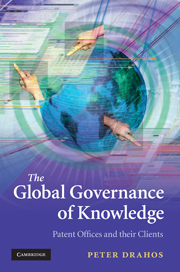Book contents
- Frontmatter
- Contents
- List of diagrams and tables
- List of abbreviations
- Preface
- 1 Patent offices and the global governance of knowledge
- 2 Labyrinths and catacombs: Patent office procedure
- 3 The rise of patent offices
- 4 The Sun and its planets: The European Patent Office and national offices
- 5 The USPTO and JPO
- 6 The age of Trilaterals and the spirit of cooperation
- 7 The jewel in the crown: India's Patent Office
- 8 The dragon and the tiger: China and South Korea
- 9 Joining the patent office conga line: Brazil
- 10 Islands and regions in the patent stream
- 11 Reclaiming the patent social contract
- 12 Patent administration sovereignty: Nodal solutions for small countries, developing countries
- Index
- References
6 - The age of Trilaterals and the spirit of cooperation
Published online by Cambridge University Press: 03 May 2010
- Frontmatter
- Contents
- List of diagrams and tables
- List of abbreviations
- Preface
- 1 Patent offices and the global governance of knowledge
- 2 Labyrinths and catacombs: Patent office procedure
- 3 The rise of patent offices
- 4 The Sun and its planets: The European Patent Office and national offices
- 5 The USPTO and JPO
- 6 The age of Trilaterals and the spirit of cooperation
- 7 The jewel in the crown: India's Patent Office
- 8 The dragon and the tiger: China and South Korea
- 9 Joining the patent office conga line: Brazil
- 10 Islands and regions in the patent stream
- 11 Reclaiming the patent social contract
- 12 Patent administration sovereignty: Nodal solutions for small countries, developing countries
- Index
- References
Summary
Trilateral cooperation
In the last quarter of the twentieth century three patent offices, often referred to as the Trilateral Offices, received the bulk of patent applications and issued most of the world's patents: the United States Patent and Trademark Office (USPTO), the European Patent Office (EPO) and the Japanese Patent Office (JPO). Of the 5.5 million patents in force at the end of 2004, 83% were in force in the US, Japan and the member countries of the European Patent Convention (EPC). Two other offices have because of their large number of filings joined this first tier of patent offices – the Korean Intellectual Property Office (KIPO) and the State Intellectual Property Office (SIPO) of China.
The Trilateral story is one of informal cooperation that becomes grounded in a bilateral memorandum of understanding between the USPTO and the EPO in June 1982 and another between the USPTO and the JPO in 1983, followed by a memorandum amongst all three in 1983. What accounts for this deepening of international cooperation given, as we saw in Chapter 3, that the patent institution has been important to the trade and protectionist policies of states? The explanation hinges on two factors – the role of transnational corporations (TNCs) in the system as demanders of patent office cooperation and the workload problems facing the Trilaterals.
TNCs, the biggest users of the patent system, want a world in which at a moment of their choosing they can obtain high-quality patents at low cost.
- Type
- Chapter
- Information
- The Global Governance of KnowledgePatent Offices and their Clients, pp. 177 - 198Publisher: Cambridge University PressPrint publication year: 2010



